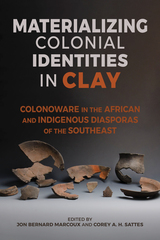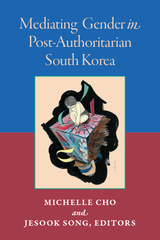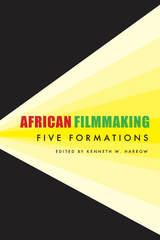

Unlike the papers of some other great economists, those of Kenneth Arrow are being read and studied today with even greater care and attention than when they first appeared in the journals. The publication of his collected papers will therefore be welcomed by economists and other social scientists and in particular by graduate students, who can draw from them the deep knowledge and the discernment in selection of scientific problems that only a master can offer. The author has added headnotes to certain well-known papers, describing how he came to write them.
The study of production is central to economic theory, and capital and its accumulation are two of the most interesting aspects of the modern production process. Capital may take the form of inventories of inputs, inventories of outputs, or machines and other fixed goods. The essential and unique aspect of all types of capital is that it must be accumulated as the result of prior stages of the production process. This gives the dynamic theory of production a recursive structure that can be exploited by economic analysis. The optimization of production under recursive conditions lends itself to general mathematical methods of dynamic programming and optimal control theory. This is the main theme of the essays included in this fifth volume of Kenneth Arrow's Collected Papers.

Unlike the papers of some other great economists, those of Kenneth Arrow are being read and studied today with even greater care and attention than when they first appeared in the journals. The publication of his collected papers will therefore be welcomed by economists and other social scientists and in particular by graduate students, who can draw from them the deep knowledge and the discernment in selection of scientific problems that only a master can offer. The author has added headnotes to certain well-known papers, describing how he came to write them.
Although economic theory has been Kenneth Arrow's comparative advantage as well as his special interest, from time to time he has turned his attention to applied problems, often with unexpected results. A request from the Ford Foundation to write a survey of health economics led to his famous paper, "Uncertainty and the Welfare Economics of Medical Care," which raised for the first time many issues in the economics of information, particularly what are now called incentive compatibility issues. Other fruitful papers included in this volume deal with racial discrimination, the cost of oil imports, health insurance, environmental resources, and urban economics. Arrow's main interest in studying these disparate problems has been their potential source for new theory as well as their policy applications.
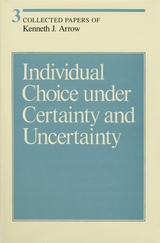
Unlike the papers of some other great economists, those of Kenneth Arrow are being read and studied today with even greater care and attention than when they first appeared in the journals. The publication of his collected papers will therefore be welcomed by economists and other social scientists and in particular by graduate students, who can draw from them the deep knowledge and the discernment in selection of scientific problems that only a master can offer. The author has added headnotes to certain well-known papers, describing how he came to write them.
The third volume of Kenneth Arrow's Collected Papers concerns the basic concept of rationality as it applies to an economic decision maker. In particular, it addresses the problem of choice faced by consumers in a multicommodity world and presents specific models of choice useful in economic analysis. It also discusses choice models under uncertainty, giving the basic theory and critiques of this theory based on experimental evidence and applications. Among the major papers are "Alternative Approaches to the Theory of Choice in Risk-Taking Situations," a masterly survey of subjective probability and choice theory, and "The Theory of Risk Aversion," an exposition of the theory of choice under uncertainty.
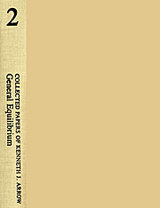
Unlike the papers of some other great economists, those of Kenneth Arrow are being read and studied today with even greater care and attention than when they first appeared in journals. This publication of his collected papers, to be completed in seven topical volumes, will be welcomed by economists and other social scientists and in particular by graduate students, who can draw from them the deep knowledge and taste in the selection of scientific problems that only a master can offer.
This volume is concerned with the foundations of neo-classical economic analysis. General equilibrium is a theory of prices in which all of the actions of the economic agents in an economy are determined simultaneously and in a decentralized fashion. The price system, determined in competitive markets, guides actions for both firms and individual consumers. All of the complex interrelations of the economy are distilled into the determination of this price system.
In these papers, Arrow examines the conditions under which such a price system would exist. He also clarifies the conditions under which the system can or cannot achieve an optimum. In the latter case, when “market failures” are present, he shows the role of a benevolent government in helping to overcome the induced inefficiencies.

Unlike the papers of some other great economists, those of Kenneth Arrow are being read and studied today with even greater care and attention than when they first appeared in the journals. The publication of his collected papers will therefore be welcomed by economists and other social scientists and in particular by graduate students, who can draw from them the deep knowledge and the discernment in selection of scientific problems that only a master can offer. The author has added headnotes to certain well-known papers, describing how he came to write them.
This volume begins with Arrow's papers on statistical decision theory, which served as a foundation for his work on the economics of information. As he writes in his preface, "Statistical method was an example for the acquisition of information. In a world of uncertainty, it was no great leap to realize that information is valuable in an economic sense." The later, applied papers, which operationalize the theory of the early ones, include essays on the demand for information, the economic value of screening devices, and the effect of incomplete information on the structure of organizations, futures markets, and insurance.

Unlike the papers of some other great economists, those of Kenneth Arrow are being read and studied today with even greater care and attention than when they first appeared in the journals. The publication of his collected papers will therefore be welcomed by economists and other social scientists and in particular by graduate students, who can draw from them the deep knowledge and the discernment in selection of scientific problems that only a master can offer. The author has added headnotes to certain well-known papers, describing how he came to write them.
In this first volume, Arrow takes up the basic question of whether collective choices can be made in such a way as to reflect individual preferences. The seminal 1950 paper that opens the volume shows that given certain reasonable conditions that social choices must satisfy to reflect individual preferences, it is impossible to make a choice among all sets of alternatives without violating some of the conditions. The subsequent papers extend, deepen, and clarify these results and examine the concept of justice, both in the abstract and in economic models. The volume also contains searching critiques of the theories of justice of John Rawls and Robert Nozick.
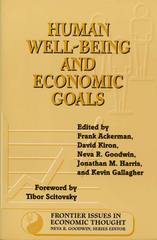
What are the ends of economic activity? According to neoclassical theory, efficient interaction of the profit-maximizing "ideal producer" and the utility-maximizing "ideal consumer" will eventually lead to some sort of social optimum. But is that social optimum the same as human well-being? Human Well-Being and Economic Goals addresses that issue, considering such questions as:
- Does the maximization of individual welfare really lead to social welfare?
- How can we deal with questions of relative welfare and of equity?
- How do we define, or at least understand, individual and social welfare?
- And how can these things be measured, or even assessed?
Human Well-Being and Economic Goals brings together more than 75 concise summaries of the most significant literature in the field that consider issues of present and future individual and social welfare, national development, consumption, and equity. Like its predecessors in the Frontier Issues in Economic Thought series, it takes a multidisciplinary approach to economic concerns, examining their sociological, philosophical, and psychological aspects and implications as well as their economic underpinnings.
Human Well-Being and Economic Goals provides a powerful introduction to the current and historical writings that examine the concept of human well-being in ways that can help us to set goals for economic activity and judge its success. It is a valuable summary and overview for students, economists, and social scientists concerned with these issues.
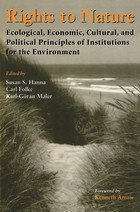
Property rights are a tool humans use in regulating their use of natural resources. Understanding how rights to resources are assigned and how they are controlled is critical to designing and implementing effective strategies for environmental management and conservation.
Rights to Nature is a nontechnical, interdisciplinary introduction to the systems of rights, rules, and responsibilities that guide and control human use of the environment. Following a brief overview of the relationship between property rights and the natural environment, chapters consider:
- ecological systems and how they function
- the effects of culture, values, and social organization on the use of natural resources
- the design and development of property rights regimes and the costs of their operation
- cultural factors that affect the design and implementation of property rights systems
- coordination across geographic and jurisdictional boundaries
READERS
Browse our collection.
PUBLISHERS
See BiblioVault's publisher services.
STUDENT SERVICES
Files for college accessibility offices.
UChicago Accessibility Resources
home | accessibility | search | about | contact us
BiblioVault ® 2001 - 2024
The University of Chicago Press



